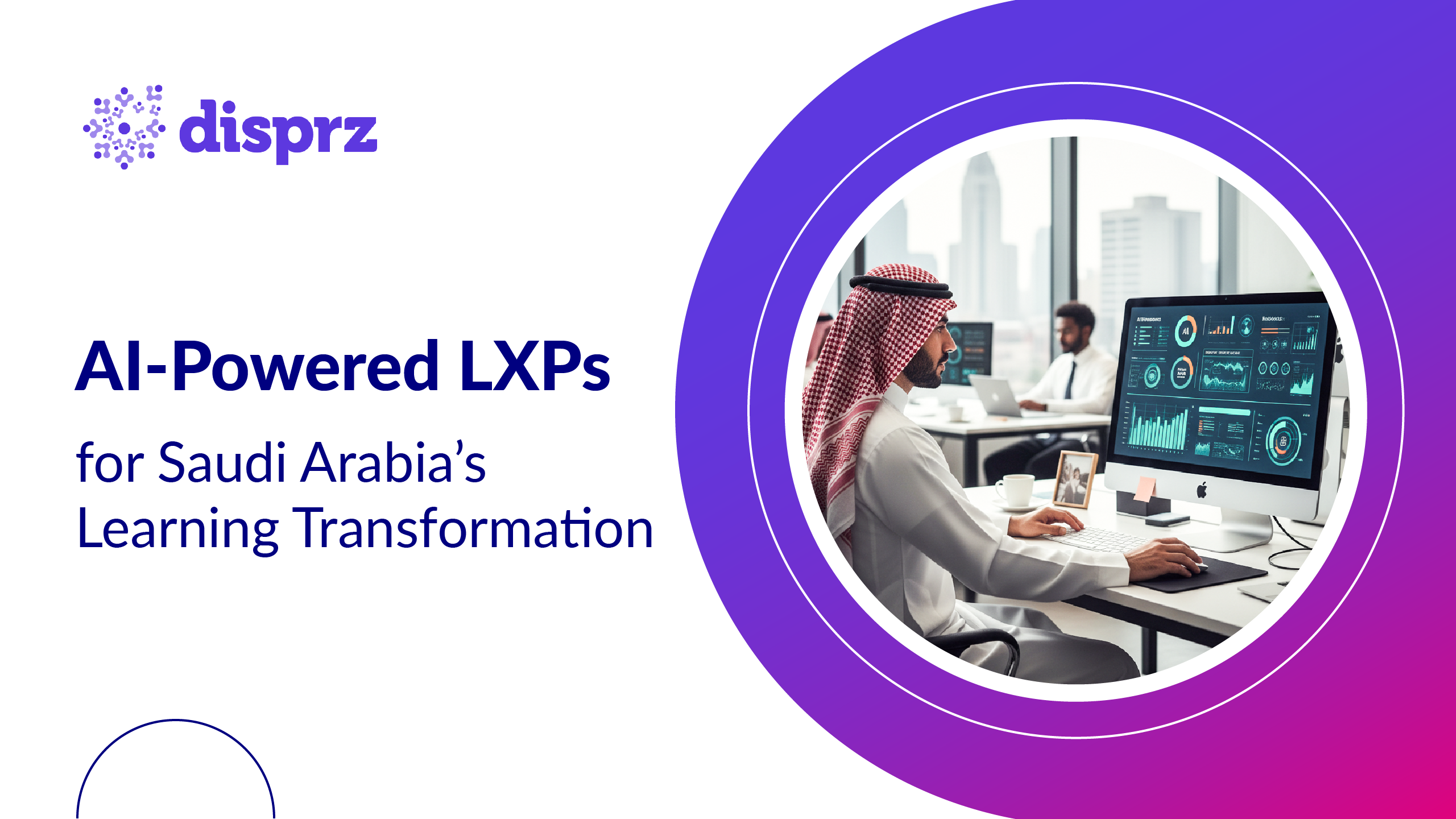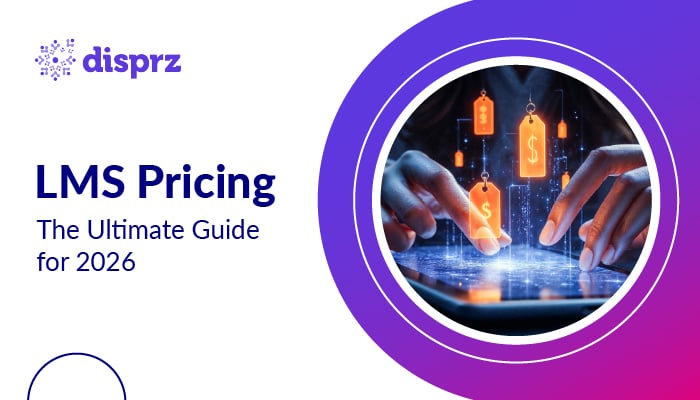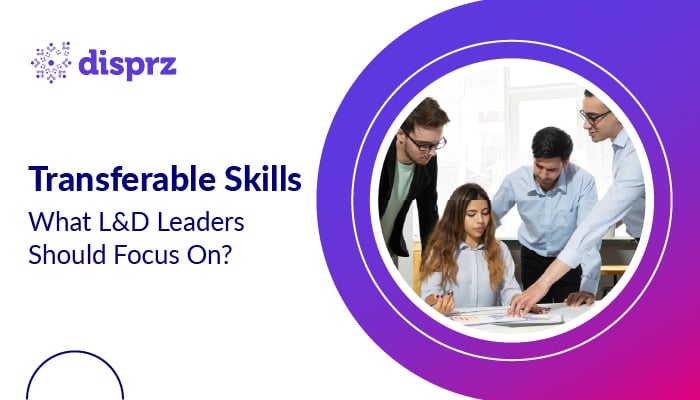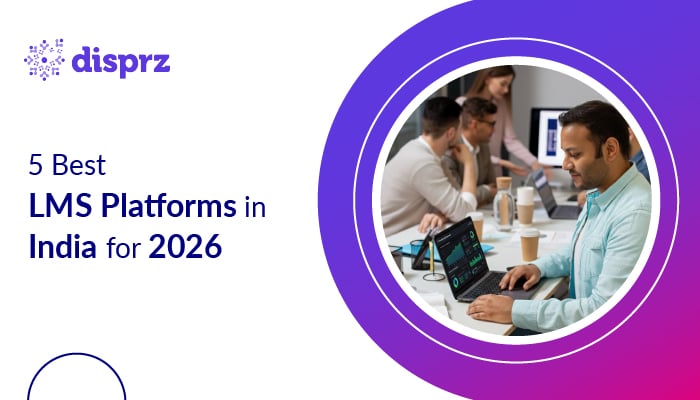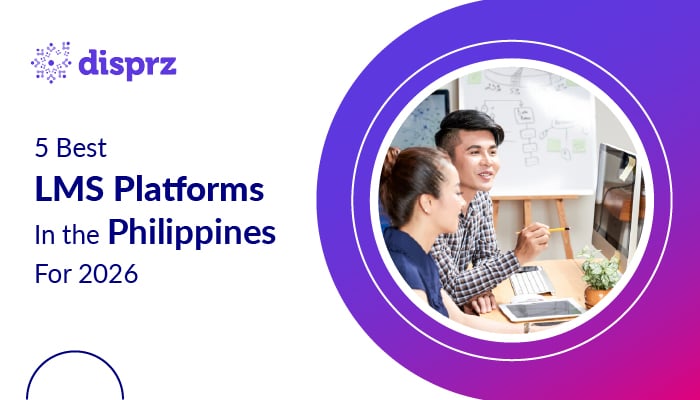When Saudi Arabia launched Vision 2030, it reframed workforce development as a national priority. The challenge was to reskill millions of employees fast enough to match the pace of digital transformation. Traditional classroom training and static e-learning were never going to keep up.
Recent research from PwC’s Hopes and Fears Survey found that 67% of Saudi employees believe upskilling in the next five years will directly impact their ability to succeed at work.
Yet many organizations are still finding their footing with AI-driven learning solutions. This disconnect between high employee motivation and uneven organizational readiness creates both a challenge and an opportunity. AI-powered Learning Experience Platforms (LXPs) sit squarely at this intersection, enabling companies to deliver personalized learning, track ROI, and scale successful pilots into enterprise-wide programs that drive measurable impact.
Why Saudi Enterprises Are Adopting AI-Powered LXPs
Saudi enterprises are rapidly realizing that workforce development can no longer rely on generic, one-size-fits-all programs. The scale and diversity of their workforce, from frontline staff in manufacturing and retail to knowledge workers in banking and healthcare, demand learning solutions that are both adaptive and measurable. AI-powered LXPs in Saudi Arabia help bridge this gap, turning training into a strategic lever that aligns employee growth with business goals.
The benefits go far beyond traditional corporate training:

Personalized Learning Paths
AI adapts content to each employee’s skills, role, and career trajectory, creating a learning journey that is meaningful and relevant. For example, instead of all sales staff receiving the same modules, LXPs can assign advanced negotiation training only to those ready for it, while providing foundational modules to newer team members, ensuring every learner progresses efficiently.
AI-Driven Insights and ROI Tracking
LXPs connect learning to measurable business results. Leaders can see how skill acquisition influences performance, compliance, and productivity, enabling data-driven decisions about talent development investments. This transforms learning from a cost center into a strategic asset.
Reskilling at Scale
In industries undergoing rapid digital transformation, LXPs allow organizations to upskill large teams quickly. Engineers, frontline workers, and knowledge professionals can all acquire the skills needed to adopt new technologies without slowing down operations.
Enhanced Engagement and Retention
When learning is personalized, relevant, and adaptive, employees are more likely to complete programs and stay motivated. This engagement not only strengthens skill development but also improves retention, as employees feel supported in their growth.
Key Features to Look for in an AI-Powered LXP
| Key Feature | What it Does | Strategic Impact / Example |
|---|---|---|
| AI-driven Personalization & Adaptive Journeys |
Curates content based on role, skills, learning pace, and career goals | Ensures each employee gets relevant learning; e.g., a bank can provide advanced analytics training to senior analysts while offering basics to newcomers, accelerating readiness |
| Mobile-first, Multilingual (Arabic + English) |
Accessible on any device, in local and global languages | Increases adoption and inclusivity; employees can learn anytime, anywhere, in the language they are most comfortable with |
| Seamless Integration with HR & LMS |
Connects learning data to HR systems, talent management, and existing LMS | Eliminates silos, enables performance-linked learning, and simplifies reporting for compliance-heavy sectors |
| Data Analytics & ROI Tracking |
Tracks learning engagement, completion, skill acquisition, and business outcomes | Provides leaders with actionable insights to optimize programs, link learning to productivity, and demonstrate ROI |
| Scalability & Governance | Supports large, distributed teams while maintaining security, compliance, and content governance | Enables enterprise-wide adoption; ensures consistent learning standards across all locations and departments |
How Can Saudi Enterprises Scale AI-Powered Learning Across the Organization?
Scaling an AI-powered LXP is a structured journey. It is not a one-off deployment. Enterprises need to follow clear steps to ensure adoption, impact, and long-term sustainability, especially when implementing an enterprise learning platform in KSA:
Define Goals & Target Learner Groups
Begin by identifying which skills are critical for business objectives and which employees need them most. This ensures that learning is purposeful, aligned with strategic priorities, and avoids generic “tick-box” programs. For instance, frontline staff may need operational skills, while managers require digital leadership capabilities.
Launch Pilot with Select Teams
Start small with a representative cohort to test content, platform usability, and AI-driven personalization. A well-scoped pilot provides insights into learner behavior, technical challenges, and engagement patterns without overwhelming the organization.
Measure Adoption & Engagement KPIs
Track metrics such as completion rates, active participation, and skill acquisition. Use these insights to refine learning paths, address gaps, and demonstrate early ROI to stakeholders. Measuring both quantitative and qualitative outcomes ensures learning is linked to performance.
Address Change Management Challenges
Adoption is rarely automatic. Managers must advocate for learning, align incentives, and create a culture where continuous development is valued. Addressing resistance proactively, through communication, coaching, and recognition, ensures smooth scaling.
Expand Enterprise-Wide with Executive Buy-In
Scaling beyond the pilot requires visible leadership support. Executives should reinforce the strategic importance of learning, allocate resources, and champion the LXP as a core part of organizational growth. Their endorsement signals to employees that development is a priority rather than an optional task.
Common Pitfalls in Scaling AI-Powered LXPs and How to Avoid Them
1) Prioritizing Technology Over Learner Needs
Focusing too much on features, dashboards, or AI capabilities without considering the actual learning experience can backfire. Employees may find the platform confusing or irrelevant, leading to low engagement. Successful LXP adoption starts with understanding learner needs, designing content for real-world application, and ensuring the system feels intuitive and supportive rather than just “high-tech.”
2) Ignoring Cultural Adoption Challenges
Saudi enterprises have diverse workforces, and ignoring language, local norms, or workplace culture can reduce participation. For instance, content delivered solely in English or based on global templates may fail to resonate. Customizing learning experiences to reflect Arabic and English preferences, cultural context, and local work practices ensures learners feel included and motivated.
3) Poor System Integration
An LXP that operates in isolation from HR, LMS, or performance management systems creates data silos and prevents meaningful insights. Without integration, it becomes difficult to link learning outcomes to business goals or track compliance. Seamless integration enables leaders to see progress, make informed talent decisions, and measure ROI effectively.
4) Insufficient Leadership Support
Even the most advanced platforms will struggle without visible executive sponsorship. Employees often take cues from leadership. If executives are not actively promoting learning initiatives, staff may treat them as optional. Leaders must visibly champion the platform, allocate resources, and reinforce the strategic importance of continuous development.
5) Neglecting Content Relevance
Generic or outdated content fails to engage employees and undermines trust in the platform. To maintain relevance, organizations must continuously curate, update, and align content with evolving business priorities and individual learner needs, ensuring every module feels purposeful and actionable.
6) Lack of Continuous Feedback & Iteration
Platforms that remain static fail to evolve alongside learner and organizational needs. Without mechanisms to collect feedback and analyze engagement, it’s difficult to identify gaps or improve learning journeys. Establishing a culture of continuous iteration keeps the LXP responsive, effective, and aligned with long-term business goals.
Best Practices for Scaling LXPs in Saudi Arabia

1) Secure Leadership Sponsorship
Scaling an AI-powered LXP requires visible, active support from executives rather than just technical advancement. Leaders set the tone for the organization; their endorsement signals that learning is a strategic priority rather than a box-ticking exercise. By championing the platform, allocating resources, and participating in key initiatives, leadership ensures adoption, engagement, and long-term sustainability.
2) Build a Strong Content Ecosystem
A robust, dynamic content library is the backbone of any successful LXP. Enterprises should curate and continuously update learning materials that are role-specific, culturally relevant, and aligned with business goals. Combining internal knowledge with external resources ensures that employees have access to both foundational and advanced skills, fostering continuous growth and relevance.
3) Train Managers for Adoption
Managers play a critical role in driving learning at scale. When managers understand the platform and its benefits, they can coach, motivate, and hold teams accountable. Equipping leaders with tools to monitor progress and integrate learning into day-to-day workflows helps reinforce adoption and embeds a culture of continuous development across the enterprise.
4) Use AI Analytics for Continuous Skill Mapping
The real power of an AI-driven LXP lies in its ability to map skills, track progress, and provide actionable insights. Analytics help identify emerging skill gaps, predict future workforce needs, and optimize learning paths for each employee. By continuously monitoring engagement and performance, enterprises can iterate their learning strategies, ensuring the platform evolves alongside organizational priorities.
The Future of AI-Powered LXPs in Saudi Arabia
AI-powered LXPs are evolving rapidly, moving beyond simple course recommendations to become central to workforce transformation.
The next step in this evolution is Agentic AI, which can actively guide learners by observing patterns, anticipating skill gaps, and creating adaptive learning journeys autonomously. Rather than waiting for employees to choose their next course, these systems suggest, assign, and optimize learning in real time, making development proactive and highly targeted. Rather than waiting for employees to choose their next course, these systems suggest, assign, and optimize learning in real time, making development proactive and highly targeted. The UAE Roads and Transport Authority offers a concrete example: Chatbot Mahboub reduced live chat call volumes by 40% in just two years, demonstrating how intelligent systems can optimize operations and free human capital for higher-value work.
Looking further ahead, enterprises must prepare for autonomous skill development systems that are platforms that not only track and recommend learning but also enable employees to acquire, practice, and apply skills with minimal manual intervention. For Saudi organizations aiming to meet Vision 2030 objectives, these self-driving learning ecosystems will be key to sustaining competitive advantage, fostering innovation, and ensuring a workforce that is agile and future-ready.
Conclusion
Emerging technologies, rapid urbanization, environmental awareness, and the shift toward a circular economy are reshaping the labour market. Automation and green initiatives are creating entirely new occupations while rendering some traditional roles and skill sets obsolete. In this context, AI-powered learning platforms are crucial tools for organizations to identify skill gaps and prepare their workforce for a rapidly evolving environment.
To navigate this evolving landscape, organizations need agile learning platforms that facilitate continuous skill development. Platforms like Disprz enable organizations to build these capabilities at scale by personalizing learning journeys, tracking skill growth, and aligning development with business outcomes. Book a demo today to see how your organization can start scaling skills with AI-driven learning.
FAQs
1) How is an LXP different from an LMS in Saudi Arabia?
Learning Experience Platforms (LXPs) focus on personalized, learner-driven experiences, whereas traditional Learning Management Systems (LMS) primarily manage course administration and compliance tracking. In Saudi enterprises, LXPs leverage AI to recommend content, adapt to learner behavior, and integrate with business systems. This approach ensures employees acquire skills aligned with real-time business needs, creating engagement and measurable impact beyond the transactional course completion model typical of LMS platforms.
2) Why are Saudi enterprises adopting AI-powered LXPs?
Saudi enterprises are embracing AI-powered LXPs to address rapid digital transformation, reskill employees at scale, and drive measurable business outcomes. AI enables personalized learning paths, predictive skill gap analysis, and adaptive recommendations that improve engagement and productivity. Additionally, these platforms help organizations meet compliance standards and link learning directly to operational goals, making workforce development strategic rather than reactive. Adoption is driven by the need for agility in upskilling the Saudi workforce under Vision 2030.
3) How do LXPs improve compliance and ROI?
AI-powered LXPs track learning progress, completion rates, and skill acquisition in real time, making compliance reporting efficient and accurate. Beyond compliance, they enhance ROI by aligning learning initiatives with business priorities—ensuring employees develop capabilities that directly impact performance. Adaptive content delivery and data-driven insights reduce wasted learning hours, improve engagement, and accelerate skill adoption, enabling enterprises to quantify learning’s contribution to revenue growth, operational efficiency, and workforce readiness.
4) How can Saudi companies scale LXPs after pilots?
Scaling an LXP requires a structured approach: start by defining goals, identifying target learner groups, and launching pilot programs with select teams. Track engagement and adoption KPIs to identify gaps and refine strategies. Address change management challenges, train managers to support adoption, and secure executive sponsorship. Once pilots demonstrate success, expand the platform enterprise-wide with clear governance, robust content ecosystems, and ongoing analytics to continuously optimize learning outcomes at scale.
5) What’s the future of LXPs in Vision 2030 workforce plans?
In Saudi Arabia, LXPs will play a central role in Vision 2030 workforce transformation by enabling continuous upskilling, bridging skill gaps, and supporting digital adoption. The next evolution includes Agentic AI and autonomous learning systems that anticipate skill requirements, personalize development, and integrate learning with performance management. Enterprises that adopt these platforms strategically will create agile, future-ready teams capable of driving innovation, sustaining competitiveness, and achieving national economic transformation objectives.



